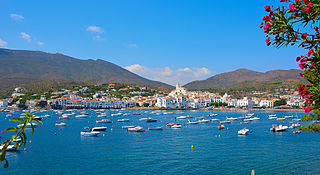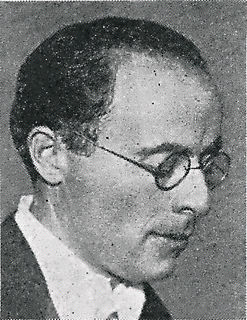
Pau Casals i Defilló, usually known in English by his Castilian Spanish name Pablo Casals, was a Spanish and Puerto Rican cellist, composer, and conductor. He is generally regarded as the pre-eminent cellist of the first half of the 20th century and one of the greatest cellists of all time. He made many recordings throughout his career of solo, chamber, and orchestral music, including some as conductor, but he is perhaps best remembered for the recordings of the Bach Cello Suites he made from 1936 to 1939. He was awarded the Presidential Medal of Freedom in 1963 by President John F. Kennedy.

Palau de la Música Catalana is a concert hall in Barcelona, Catalonia, Spain. Designed in the Catalan modernista style by the architect Lluís Domènech i Montaner, it was built between 1905 and 1908 for Orfeó Català, a choral society founded in 1891 that was a leading force in the Catalan cultural movement that came to be known as the Renaixença. It was inaugurated on 9 February 1908.

Algherese or Alguerese is the variant of Catalan spoken in the city of Alghero, in the northwest of Sardinia, Italy.

The music of Catalonia comprises one of the oldest documented musical traditions in Europe. In tandem with the rest of Western Europe, it has a long musical tradition, incorporating a number of different styles and genres over the past two thousand years.

Cadaqués is a town in the Alt Empordà comarca, in the province of Girona, Catalonia, Spain. It is on a bay in the middle of the Cap de Creus peninsula, near Cap de Creus cape, on the Costa Brava of the Mediterranean. It is two-and-a-quarter-hour drive from Barcelona, and thus it is accessible not only to tourists but also to people who want a second home for weekends and summers. In 2002, Cadaqués had an official population of 2,612, but up to ten times as many people can live in the town during the peak of the summer tourism season.

Baix Penedès is a comarca in Catalonia, Spain. The area has been settled since the times of the Iberians, with ancient ruins remaining in Banyeres at Can Canyís, in the capital El Vendrell at the village of Guàrdies and in Calafell at the villages of Toixoneres and la Ciutadella.

The Forest of Remembrance, formerly known as the Forest of the Departed, is a memorial garden located in the park of Parque del Buen Retiro in Madrid, Spain that commemorates the 191 civilian victims of the 2004 Madrid train bombings on the 11th of March 2004 and the special forces agent who died when the seven suicide bombers subsequently killed themselves on March 11th 2004 while under siege by security forces in their apartment block.
Judaeo-Catalan, also called Catalanic or Qatalanit, was a presumed Jewish language spoken by the Jews in Northern Catalonia and what is today Northeastern Spain, especially in Catalonia, Valencia and the Balearic Islands.

Emanuel Feuermann was an internationally celebrated cellist in the first half of the 20th century.

Prades is a subprefecture of the Pyrénées-Orientales department in the Occitanie region of Southern France. In 2018, the commune had a population of 6,063. Prades is the capital of the historical Conflent comarca. Its inhabitants are called Pradéens and Pradéennes in French and Pradencs and Pradenques in Catalan. It is also the hometown of Jean Castex, who served as Prime Minister of France from 2020 to 2022.
The Song of the Sibyl is a liturgical drama and a Gregorian chant, the lyrics of which comprise a prophecy describing the Apocalypse, which has been performed in churches on Majorca and Alghero, and some Catalan churches, in the Catalan language on Christmas Eve nearly uninterruptedly since medieval times. It was declared a Masterpiece of the Oral and Intangible Heritage of Humanity by UNESCO on 16 November 2010.
Casals is a Catalan surname, the plural form of Casal (house). Notable persons with that surname include:

C-32 is a primary highway in Catalonia, Spain. It was created in 2004 by merging three sections of existing autopistas and autovías. This re-organisation was part of a renaming of primary highways managed by the Generalitat de Catalunya. According to this new denomination, the first number (C-32) indicates that is a southwest-northeast highway, while the second number (C-32) indicates that is the second-closest to the Mediterranean Sea.

The Occitano-Romance or Gallo-Narbonnese, or rarely East Iberian, is a branch of the Romance language group that encompasses the Catalan/Valencian and Occitan languages spoken in parts of southern France and northeastern Spain.
Maurice Gendron was a French cellist, conductor and teacher. He is widely considered one of the greatest cellists of the 20th century. He was an Officer of the Legion of Honor and a recipient of the National Order of Merit. He was an active member of the French Resistance during World War II.
Pau is the Catalan equivalent of the given name Paul and is also the word for "peace" in that language. Notable people with the name include:

"I Am a Catalan" the name given to a short speech given by cellist and humanist Pau Casals in front of the General Assembly of the United Nations on the 24 October 1971. Casals was in front of the assembly to present the "Hymn of the United Nations" composed by himself and to receive the U.N. Peace Medal in recognition of his stance for peace, justice and freedom. In his acceptance speech, in English, he praised Catalonia and the Peace and Truce of God meetings, which he refers to as "the first parliament":
But let me say one thing. I am a Catalan. Today a province of Spain. But what has been Catalonia? Catalonia has been the greatest nation in the world. I will tell you why. Catalonia has had the first parliament, much before England. Catalonia had the beginning of the United Nations. All the authorities of Catalonia in the 11th century met in a city of France, at that time Catalonia, to speak about peace. 11th century! Peace in the world and against, against, against war, the inhumanity and brutality of war. This was Catalonia. I am so so happy, so moved to be here, with you.

Josep Maria Corredor was a Catalan writer, translator, teacher and cultural activist.
"El cant dels ocells" is a traditional Catalan Christmas song and lullaby. It tells of nature's joy at learning of the birth of Jesus Christ in a stable in Bethlehem. The song was made famous outside Catalonia by Pau Casals' instrumental version on the cello. After his exile in 1939, he would begin each of his concerts by playing this song. For this reason, it is often considered a symbol of Catalonia.













